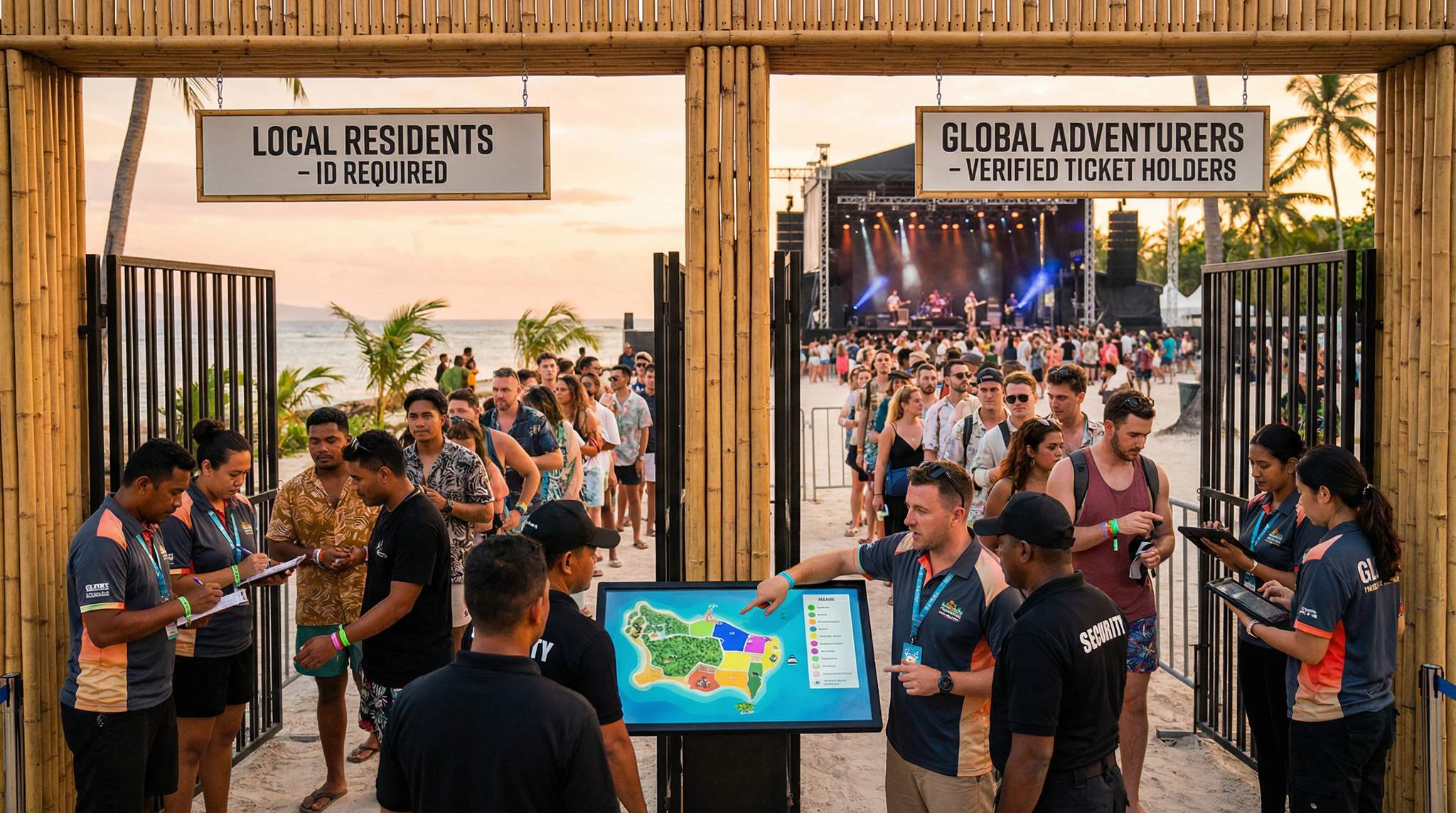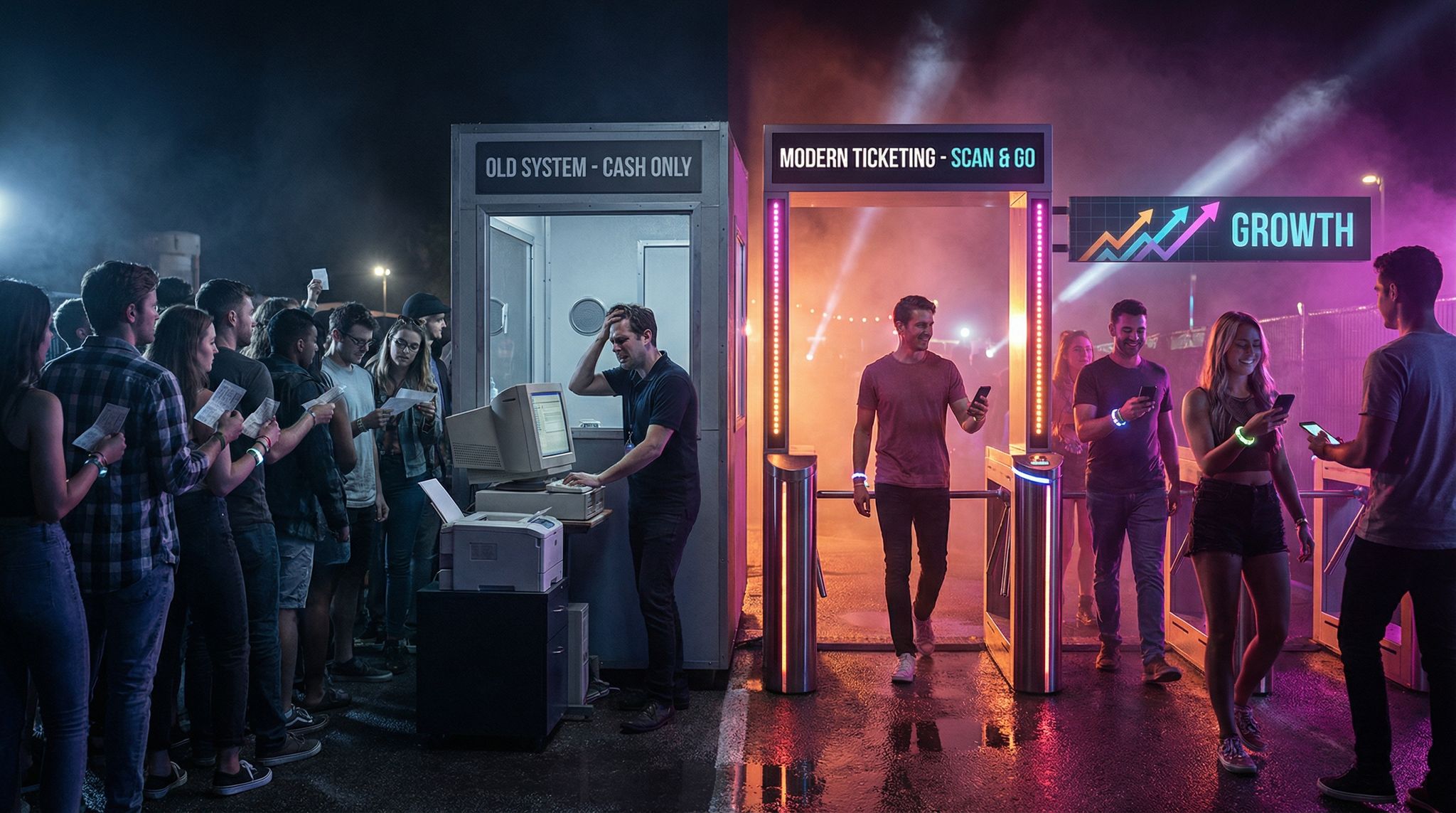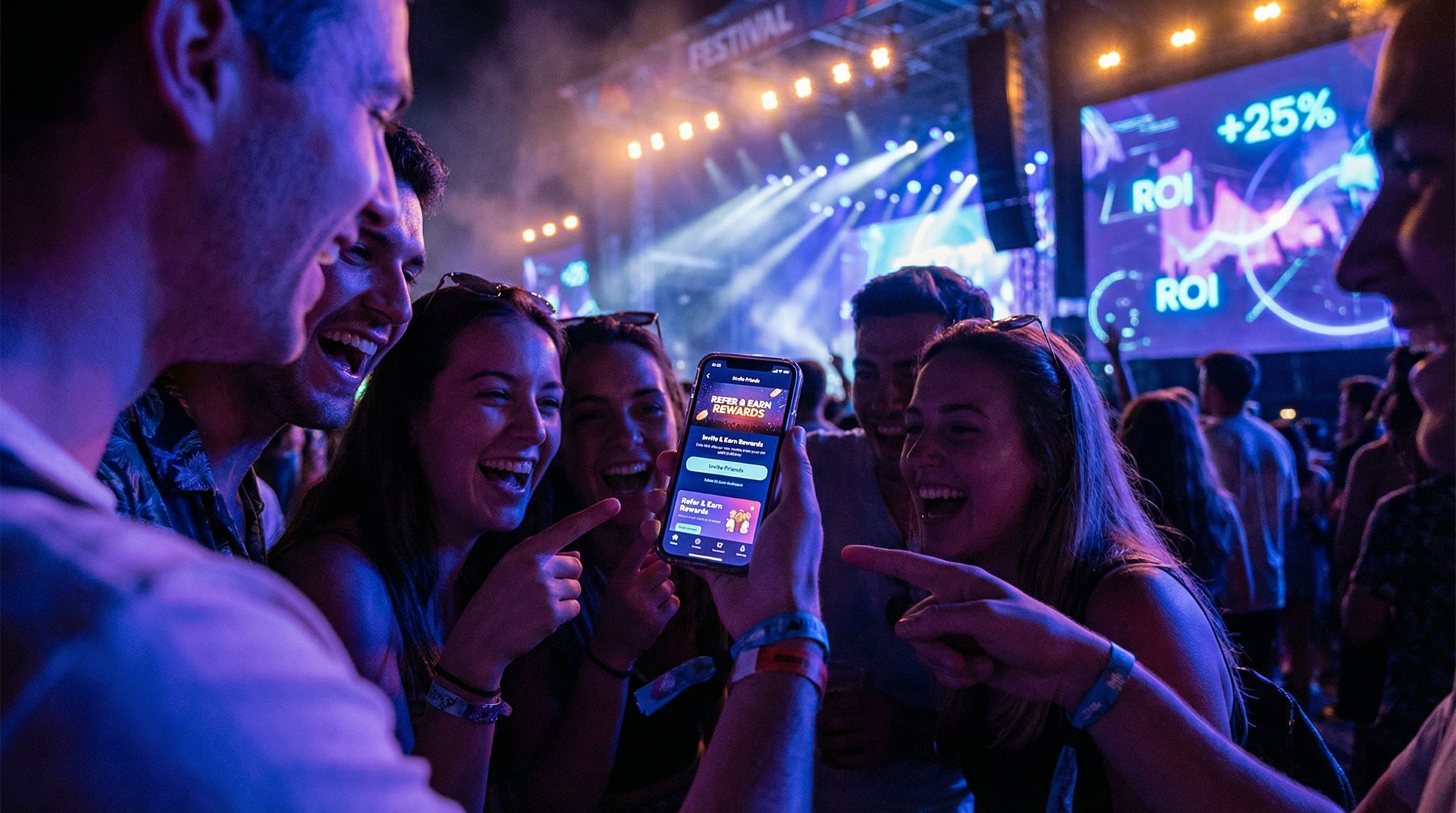Imagine a world-renowned destination festival set on a tropical island. Fans from every corner of the globe scramble to secure tickets the moment they go on sale. Within minutes, local enthusiasts might find themselves empty-handed, as tickets meant for nearby communities end up in the hands of distant resellers. In scenarios like this, festival organizers face a daunting challenge: how to ensure fairness in ticket distribution while thwarting opportunistic scalpers and gray-market dealers. The answer lies in smart strategies like regional allotments and anti-arbitrage controls – tools that protect partners, prioritize genuine fans, and preserve the festival’s integrity.
The Challenge of Feeder Markets and Gray-Market Leakage
Feeder markets – the key regions that drive large portions of a festival’s attendance – are a double-edged sword. On one hand, these markets (e.g., major cities or countries with fervent fan bases) can make a festival successful by sending thousands of attendees. On the other hand, they create opportunities for gray-market leakage, where tickets intended for one region or price tier leak out to another. This leakage often happens when brokers or well-connected buyers purchase tickets in bulk from a less regulated or discounted region and resell them elsewhere for profit.
For example, if a destination festival in Asia offers discounted tickets to local residents, an enterprising scalper from abroad might try to grab those cheaper tickets and resell them to international attendees at a markup. Not only does this undermine local fans’ access, it also damages the trust between the festival and its regional partners. It’s a scenario seen worldwide: high-demand events quickly sold out, with tickets reappearing on secondary markets at inflated prices. It’s not uncommon for a significant portion of tickets to end up on secondary markets via scalpers. This practice leaves genuine fans frustrated and can skew the cultural balance of a festival’s audience.
Fairness is paramount. Festival producers across the globe – from the UK to India, Australia to Brazil – recognize that maintaining an equitable ticket distribution isn’t just ethically right, it’s good business. A fair system ensures local communities feel included, international travelers feel welcome (not priced out), and official partners (like travel agencies or regional promoters) have their efforts rewarded. Achieving this balance requires deliberate controls to prevent arbitrage between regions.
Keep Tickets in Fans' Hands
Our secure resale marketplace lets attendees exchange tickets at face value, eliminating scalping while keeping you in control of the secondary market.
Regional Allotments and Geo-Fenced Ticketing
One of the most powerful tools to uphold fairness is implementing regional ticket allotments. This means reserving portions of your ticket inventory for specific geographic groups or markets. By geo-fencing ticket sales (limiting purchases to fans in a certain location or with a certain residency), festival organizers can ensure that each key region gets access to a fair share of tickets.
There are several ways to implement geo-fenced inventory:
Planning a Festival?
Ticket Fairy's festival ticketing platform handles multi-day passes, RFID wristbands, and complex festival operations.
-
Country-specific Sales: Host separate ticket sale events for different regions. For instance, a major festival in Europe might hold an exclusive early sale for local residents of the host country, before opening tickets to the rest of the world. This is exactly what Belgium’s famed Tomorrowland festival does – it offers a dedicated sale just for Belgian citizens ahead of the global ticket sale, a process outlined in Costin Busioc’s guide to Tomorrowland ticketing. This kind of local allotment guarantees that the home crowd isn’t overlooked in the rush.
-
Regional Quotas: Allocate a fixed number or percentage of tickets to particular countries or continents based on demand or strategic importance. If past data shows that 30% of attendees come from the USA, 25% from Europe, 15% from Asia, and so on, you can set aside roughly those percentages in the initial sales. Some international festivals even ensure each country gets at least a small allotment of tickets to encourage a diverse global mix. A prime example is Tomorrowland’s “First 20” system – the first 20 buyers from every country (who complete a pre-registration) are given an exclusive window to purchase tickets, practically guaranteeing each nation a presence among the attendees.
-
Geo-locked Purchase Links: Use ticketing platforms that allow region-locking. Fans might receive a purchase link or access code that only works if they are accessing from a specific country or if their account is registered in that region. Modern ticketing solutions (such as Ticket Fairy’s platform) support configuring such geo-fenced ticket tiers, so that, for example, only users with a mailing address or IP from Country X can buy tickets from Country X’s allotment. This protects any special pricing or allocations for that region.
Geo-fencing does require some tech considerations. IP-based restrictions can be a blunt instrument – savvy buyers may use VPNs to mask their location and sneak into another region’s sale, a workaround noted in TechRadar’s tips for buying festival tickets. To counter this, combine geo-fencing with other verification methods. For instance, require buyers to use a credit card registered in the target country, or to enter a national ID/passport number that matches the region during purchase. Several Asian and European festivals have successfully used national ID checks during online checkout to ensure only residents access certain ticket blocks.
Smooth Entry With Mobile Check-In
Scan tickets and manage entry with our mobile check-in app. Supports photo ID verification, real-time capacity tracking, and multi-gate coordination.
The benefit of regional allotments is partner protection and community goodwill. Many destination festivals collaborate with local promoters or tourism boards in various countries who help sell packages or promote the event. By giving each partner a protected inventory to sell (and by preventing outsiders from accessing those tickets), you honor those agreements and invest in long-term relationships. You’re also signaling to local fans that they are not being muscled out by international tourists with deeper pockets. The net effect is a festival audience that remains true to its intended makeup – a healthy balance of locals and travelers – and less incentive for anyone to game the system across borders.
Identity Verification and ID Checks
Another cornerstone of anti-arbitrage control is strong identity verification for ticket buyers and attendees. Tying tickets to individuals’ identities makes it much harder for scalpers to operate across regions, because it raises the stakes for any resale or bulk purchasing scheme.
Need Festival Funding?
Get the capital you need to book headliners, secure venues, and scale your festival production.
Personalized Tickets: One approach is to issue tickets that are name-bound – each ticket has the attendee’s name, and photo ID checks are conducted at the festival entrance to ensure the person entering is the person named on the ticket. This strategy has been used at large events in Europe and Asia to deter resale; a ticket bought cheaply in one region can’t easily be flipped to someone from another region if the name on it can’t be changed. For example, Glastonbury Festival in the UK requires ticket buyers to pre-register with a photo ID; each ticket comes printed with the attendee’s photograph, making unauthorized transfer virtually impossible. Of course, to make this workable, festivals need a process for legitimate transfers or name changes (for fans who can’t attend last-minute), but these changes can be tightly controlled to prevent abuse.
ID Validation at Purchase: Going a step further, some ticketing systems now integrate ID verification during the buying process. This might involve the buyer uploading an official ID document or verifying their identity through a secure third-party service. By doing so, you confirm that each person is unique (preventing bots or duplicate accounts) and possibly confirm their region of residence. For example, a festival could require that anyone buying from the “Local Resident” ticket category validate their government-issued ID to prove local residency. This ensures the discounted local tickets aren’t quietly bought up by outsiders. Major ticket marketplaces and festivals have started embracing such measures – including “verified fan” pre-registration systems – to verify individuals and prevent ticket scalping.
Onsite ID Checks and Wristband Activation: Festival organizers can also use the event check-in process as an anti-leak checkpoint. Requiring attendees to show the credit card used for purchase or a matching ID when picking up wristbands can catch cases where a third-party purchased the ticket. Some events issue wristbands that only activate when the buyer’s identity is confirmed at a special onsite event registration platform checkpoint. These steps add a bit of friction, but they dramatically discourage gray-market transactions. A scalper isn’t keen to sell a ticket that might be useless if the buyer gets flagged for not matching the original purchaser’s ID.
In applying ID checks, balance is key. Attendees worldwide have different comfort levels with privacy, so be transparent about why you need identity information. Emphasize that it’s to protect fans and ensure everyone pays a fair price. Most genuine fans are happy to cooperate when it means a safer, fairer festival experience. In fact, fan sentiment surveys show strong support for anti-scalping measures – for instance, a majority of British consumers say dynamic pricing is unfair, as shown in YouGov research on live event pricing concerns, indicating that ticket buyers value fairness over opportunistic price gouging.
Intelligent Quotas and Purchase Limits
Limited ticket supply and overwhelming demand are a recipe for arbitrage. That’s where quotas and purchase limits come in as controlled deterrents. By capping how many tickets can be bought or reserved under various conditions, festival producers can prevent hoarding and bulk resale.
Per-Person Limits: Almost all festivals impose a limit on how many tickets each customer can buy (often 4–6 tickets max per transaction or per credit card). This is the first line of defense against scalpers forming cartels to grab dozens of tickets. Enforcing this strictly – and voiding orders that exceed the limit through multiple transactions – sends a clear message: one group or broker won’t hijack your sale. Make sure your ticketing platform can detect and block attempts to circumvent the limit (for example, the same user trying to buy in separate orders or using multiple accounts that share an address or credit card). Advanced systems like Ticket Fairy automatically flag such patterns, so festival organizers can review and cancel fraudulent orders before tickets go out.
Regional Quotas: As discussed earlier, regional allotments are essentially quota systems too. Beyond the initial allocation, you should also plan for how to handle unused quotas. Let’s say you reserved 500 tickets for a particular feeder market (e.g., a country or a sales partner agency) and only 300 sold. Rather than let 200 tickets go unsold, have a strategy to reallocate them – perhaps opening those tickets up to a general worldwide sale or distributing them to other high-demand regions – but timing is key. Always give each region a fair window (maybe a few weeks) to purchase their allotment; then, close the gap by releasing leftovers in a controlled manner (with continued monitoring for scalpers swooping in). Clear communication is crucial here: fans and partners should know that unsold allocations will be redistributed, so there’s no surprise or feelings of injustice.
Ticket Type Quotas: Another angle is limiting ticket categories that are prone to arbitrage. For example, if you offer discounted youth tickets or local-only passes, set strict limits and verification on those. Some festivals implement a quota on special-priced tickets – e.g., only 10% of total sales can be “local discount” tickets – ensuring that the bulk of sales still come through standard channels. Coupled with ID checks, this prevents an imbalance where too many cheap tickets leak out and undercut the normal tickets.
Monitor and Adapt: Use real-time sales data to adjust quotas if needed. If one region’s demand is far lower than expected and another is off the charts, a dynamic allocation (without changing prices) can optimize sales and attendance. The goal is to sell out the festival in a way that honors the spirit of your original allotments. Tools in your ticketing software should allow you to set caps and get alerts when thresholds are reached, enabling you to make on-the-fly decisions – for example, pausing sales in one region if its cap is hit, or temporarily raising the cap if genuine demand justifies it and it won’t hurt fairness.
Keeping It Fair and Transparent
Behind all these technical controls, an experienced festival producer knows that transparency and communication are essential. Attendees and partners will support anti-arbitrage measures if they understand them. Here are a few best practices to reinforce fairness and trust:
-
Communicate Allotments: Let your audience know in advance that tickets are being allocated across regions or that certain sales are geo-restricted. When Tomorrowland announces separate Belgian-only sales or when Glastonbury Festival offers coach-package tickets before general admission, they make those rules clear up front. Publicizing this helps manage expectations and reduces the perception of bias. Attendees from afar know locals get a head start (which is fair), and locals appreciate the gesture.
-
Publish Purchase Limits Openly: State the per-person ticket limit on all sales materials. This deters would-be scalpers from even trying, and it reminds regular buyers to plan within those limits (like organizing friends into buying groups if needed).
-
Warn About Unauthorized Resale: In your terms and on the ticket page, explicitly warn that tickets bought from third-party resale sites or outside designated regions may be void. Some festivals go as far as canceling tickets identified on resale platforms or requiring re-validation of buyer info for flagged orders. If you have the ability and resolve to enforce it, this hard-line stance can scare off a lot of gray-market activity. (Be sure to consult local laws and regulations when doing this, as ticket resale rules vary by country.)
-
Partner with Local Authorities: In some countries, reselling tickets above face value is illegal. Work with authorities or event industry associations where applicable to enforce these laws. While legal action isn’t a primary tool for comprehensive festival ticketing software solutions, knowing that the law backs your anti-scalping stance can strengthen your position. It also shows fans you’re on their side in fighting exploitative pricing.
-
Leverage Technology: Keep exploring new tech solutions, like blockchain-based ticketing (which can lock each ticket to a verified digital identity) or advanced bot detection on your ticket sales portal. Every year, fraudsters evolve new tactics, so the most successful festival organizers stay one step ahead with updated tools. Many modern platforms, including Ticket Fairy, continuously update anti-bot and anti-fraud measures behind the scenes so that a festival producer can focus on the big picture – curating an amazing event – rather than chasing down scalpers.
Case in Point: A Multi-National Festival Success Story
To illustrate how these strategies come together, consider a hypothetical (but very plausible) scenario. Global Beats Festival is a destination music festival that rotates host countries each year. When it was held in Mexico, the organizers anticipated huge interest from North America, Europe, and Asia. They implemented regional allotments: 40% of tickets for Latin American buyers (with a chunk reserved specifically for Mexican locals), 30% for North America, 20% for Europe, and 10% for the rest of the world. Each bloc had its own online sale portal, geo-fenced by user location and payment method.
In practice, tickets in the U.S. and European allotments sold out in minutes, while the Latin American sale was slower. The festival’s ticketing team monitored sales in real time. After a designated period, they saw that about 15% of the Latin allotment (mostly the non-Mexico portion) remained. They announced that those remaining tickets would be added to the “Rest of World” pool on a certain date, giving eager fans elsewhere a second chance. Because this plan was communicated early, there was no uproar – both fans and regional partners knew unused tickets wouldn’t go to waste.
On the identity front, Global Beats Festival required each buyer to create an account with a verified email and phone number. For local Mexican tickets, buyers had to input a national ID number, and later, at wristband collection, show corresponding ID. The festival also printed names on all tickets for entry. As a result, hardly any tickets from the Mexican locals’ allotment ended up on resale sites – it was too risky to try. Meanwhile, the U.S. and UK ticket allotments did see some secondary market listings, but the organizers traced a bulk order to a single reseller and canceled those tickets, reallocating them to a waitlist of fans. The reseller was left empty-handed (and out of pocket), and genuine fans got those passes at face value.
The outcome? Global Beats Festival reported one of its most diverse crowds ever and minimal scalping issues. The event gained praise on social media from attendees across different countries, each noting how refreshing it was to have a fair shot at tickets. Local Mexican media highlighted how many locals got to attend, thanks to the ID-verified local tickets. And the festival’s partners – travel agencies and sponsors in various countries – were delighted because the intended customers (their clients) actually bought through the proper channels instead of losing out to black-market sellers. This kind of success story shows what’s possible with a proactive approach to regional ticket controls.
Frequently Asked Questions
What are regional allotments in festival ticketing?
Regional allotments involve reserving specific portions of ticket inventory for distinct geographic groups or markets. By geo-fencing sales, organizers ensure key regions, such as local communities or major feeder markets, receive fair access. This strategy prevents tickets from leaking to distant resellers and protects agreements with local partners.
How does gray-market leakage affect destination festivals?
Gray-market leakage occurs when tickets intended for specific regions or price tiers are purchased in bulk and resold elsewhere for profit. This practice undermines local access, damages partner trust, and skews the audience cultural balance. It often involves brokers exploiting discounted local rates to sell to international attendees at inflated markups.
How can festivals implement geo-fenced ticketing?
Organizers implement geo-fenced ticketing by hosting separate sales events for specific countries or using region-locked purchase links. Verification methods include checking IP addresses, requiring credit cards registered in the target country, or validating national ID numbers during checkout. This ensures only residents of a specific area can access designated ticket blocks.
Why do festivals require identity verification for ticket buyers?
Identity verification, such as name-bound tickets and photo ID checks, prevents scalping by tying tickets to specific individuals. This makes unauthorized resale difficult since tickets cannot be easily transferred. Measures like validating government IDs during purchase or at the gate ensure that the person entering matches the original buyer, deterring gray-market arbitrage.
What is the purpose of ticket purchase limits and quotas?
Purchase limits and quotas serve as controlled deterrents against hoarding and bulk resale. Capping tickets per transaction prevents scalpers from forming cartels, while regional quotas ensure diverse attendance. Organizers can also limit specific ticket types, like local discounts, to prevent price undercutting and ensure the bulk of sales occur through standard channels.
How do anti-arbitrage controls benefit festival partners?
Anti-arbitrage controls protect partner inventory and build community goodwill. By securing protected allotments for local promoters or tourism boards, festivals honor agreements and ensure local fans are not priced out by international buyers. This fosters long-term relationships and ensures the audience remains a healthy balance of locals and travelers as intended.





